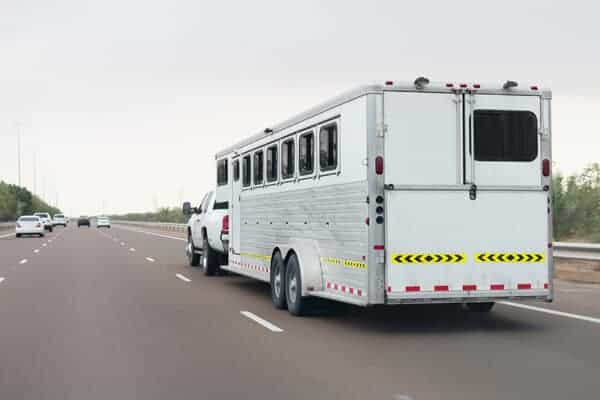Keep Your Livestock Safe with the Best Horse Hauling Insurance
Transporting live animals is a specialized activity and the FMCSA has offered specific guidelines concerning the compliance policies for livestock and insect haulers. It has also initiated certain agricultural exemptions and new regulations regarding the hours of service and CDL requirements for livestock haulers.

Keep Your Horse Haulers Safe with the Best Insurance
Regular trucking insurance usually does not cover livestock hauling. As a trucker who transports live animals like horses, cattle, pigs, bulls and others, your needs are specific, unique and involve several risks.
- Livestock Escape: Accidentally, the livestock may escape, causing collateral calamities on the road. Bringing back escaped animals poses a difficult challenge that can be a costly pursuit without any assurance.
- Death or Injury: During loading the livestock or due to other factors like heat, cold and other environmental factors, livestock may get severely injured, crippled or even die. This could cause complications for truck owners.
- Equipment Malfunction: Trailers carrying livestock have different decks to facilitate space for the animals. In case any deck collapses, it can lead to serious injuries to the animals and cause losses for the hauler.
Like anything else, horse hauling can also be a tricky affair. In addition to this, the FMCSA has set up a few guidelines that prescribe the ideal way to haul livestock, including horses. Therefore, it makes sense to have the horse trailer insured if you want to avoid problems as much as possible.
The same would apply to any kind of livestock haulers in the market. Insurance on a horse trailer would protect you from three significant issues:
It will give you coverage if the horse escapes the trailer and ends up causing damage on the way.
Many problems with livestock, including death, could be covered by the insurance.
Horse trailer insurance will also keep you safe from equipment malfunction, which is typical.
For livestock truck haulers, it is important to find the insurance policy that covers you against several risks for animal carriage. Depending on the animal you transport, these risks could be very unique and serious deliberation is required to select the balance of coverages that encompass all liabilities.
This protects you for the liabilities of livestock that die or get injured while hauling. This coverage extends to any circumstance under which this may have happened. Regardless of the specific instance, you would be covered for the loss.
This coverage specifies the conditions under which the livestock may have died to pay for the liabilities. It would be wise to select this considering various circumstances that may be encountered during the haul. This narrows down your window and if not chosen carefully, it may leave you struggling with unforeseen liabilities despite having an insurance policy in place.
This coverage includes any cargo other than livestock that may be hauled in bullwagons. It mostly refers to a range of non-living cargo and covers for damages and loss during the run.
Carcass Removal
This covers the expenses for removing the dead body of the animal from the truck. Transporting and disposing the dead body is an additional cost that many truck owners do not take into account while choosing their insurance plan.
Coverage after Transit
This covers the liabilities of the dead or injured livestock after it has been unloaded from the truck.
Livestock hauling is a completely different activity than carrying regular freight. The insurance costs range from $6,000 to $12,500 per annum. The variable pricing depends on several considerations.
- The type of livestock is an important factor in ascertaining the minimum coverage. For instance, the livestock could include high value animal, horses, pigs, dairy animals or others. The maintenance costs of the animals and their carriage risks vary.
- The type of trailer plays a major role in determining the insurance costs since the physical damage or injury to animals also depends on the risks it carries. You could be running a single deck trailer, multi-deck trailer or gooseneck.
- The purpose for which the livestock is being hauled is also an important factor in determining the risks and coverage required. For instance, you could be hauling for a farm.
- Similar to other insurance policies, the area of operations is a key component for deciding on the coverage.
- You would be required to select the specific coverages in the case of the limited livestock transit coverage. These would only include a set of circumstances under which death of an animal would be compensated.
- The deductibles and coverage limits chosen are based on your convenience.
You can choose to pay in monthly installments or for the entire year. The monthly installments seem easier on the pocket, but may include processing charges raising the overall costs. Some policies provide better costs if paid on a yearly basis.
How Can We Help?
East Insurance Group is one of the few insurance agencies that understand your needs as a livestock hauler. Transit of live animals requires a comprehensive insurance plan that safeguards your interests and provides specific coverage based on the risks incurred in the run. As a special service provider in a niche industry, you require coverage that enables you to operate risk-free. Our team of experienced insurance professionals guide you through the process of considering various options before settling on the final policy that suits your needs and your pocket.
